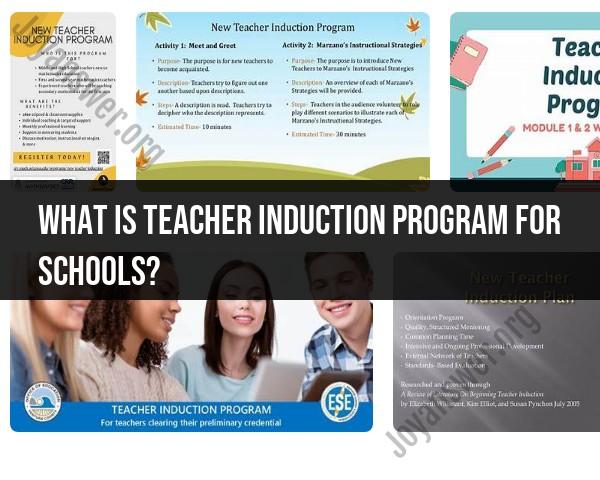What is Teacher Induction Program for schools?
A Teacher Induction Program in schools is a structured and comprehensive support system designed to help new educators make a smooth transition into their teaching roles. The primary goal of such programs is to provide support, mentorship, and professional development opportunities to newly hired teachers, ensuring their success in the early stages of their careers. Teacher induction programs are common in many educational settings and are recognized for their positive impact on teacher retention, job satisfaction, and overall effectiveness.
Key features of a Teacher Induction Program typically include:
Mentorship:
- Assigning experienced teachers or mentors to work closely with new educators. Mentors provide guidance, share insights, and help new teachers navigate the challenges of their roles.
Orientation and Training:
- Conducting orientation sessions and training workshops to familiarize new teachers with the school's policies, curriculum, instructional strategies, and administrative procedures.
Professional Development:
- Offering ongoing professional development opportunities that address the specific needs of new teachers. This may include workshops on classroom management, effective teaching strategies, and assessment methods.
Observations and Feedback:
- Facilitating classroom observations and providing constructive feedback to help new teachers improve their instructional practices. Feedback can come from mentors, administrators, or peer observations.
Collaborative Learning Communities:
- Encouraging new teachers to participate in collaborative learning communities, where they can share ideas, resources, and experiences with colleagues.
Support Systems:
- Establishing support systems within the school, such as regular check-ins with administrators, counseling services, and access to resources that assist in managing the various aspects of teaching.
Gradual Increase in Responsibilities:
- Gradually increasing the responsibilities of new teachers over time, allowing them to build confidence and competence in their roles without feeling overwhelmed.
Reflective Practice:
- Encouraging reflective practice by providing opportunities for new teachers to reflect on their teaching experiences, set goals, and develop action plans for continuous improvement.
Networking Opportunities:
- Facilitating networking opportunities for new teachers to connect with colleagues, administrators, and professionals in the education field. Networking can provide additional support and a sense of community.
Access to Resources:
- Ensuring that new teachers have access to necessary resources, including curriculum materials, technology, and any tools needed for effective teaching.
Evaluation and Assessment:
- Conducting regular evaluations and assessments to gauge the progress of new teachers. This may involve setting performance benchmarks and providing feedback to support professional growth.
Cultural Familiarization:
- Assisting new teachers in becoming familiar with the school's culture, values, and community dynamics. This includes understanding the diverse needs of students and collaborating with colleagues to create an inclusive learning environment.
Teacher induction programs are essential for retaining talented educators and fostering a positive school culture. They acknowledge the unique challenges faced by new teachers and provide the necessary support structures to help them succeed in their teaching careers. The specific components of a teacher induction program can vary from one school or district to another, but the overarching goal remains to ensure the success and professional growth of new educators.
What does the Teacher Induction Program offer to schools and educators?
The Teacher Induction Program offers various benefits to both schools and educators:
Benefits for Schools:
- Increased teacher retention: Effective induction programs can help reduce teacher turnover by providing new teachers with the support and resources they need to succeed.
- Improved student outcomes: Research shows that well-supported new teachers are more likely to be effective educators, leading to improved student learning outcomes.
- Enhanced professional development: Induction programs provide opportunities for veteran teachers to mentor and support new colleagues, leading to a more collaborative and supportive school culture.
- Improved recruitment: Strong induction programs can attract and retain high-quality teachers, leading to a more qualified and effective workforce.
- Compliance with state and federal requirements: Many states and federal programs require schools to provide induction support for new teachers.
Benefits for Educators:
- Increased knowledge and skills: Induction programs provide new teachers with the opportunity to learn essential teaching skills and strategies from experienced mentors and through professional development opportunities.
- Improved confidence and self-efficacy: Induction programs can help new teachers feel more confident and prepared for the challenges of teaching, leading to increased job satisfaction and reduced stress.
- Enhanced support network: Induction programs connect new teachers with mentors, colleagues, and administrators who can provide guidance and support throughout their first years of teaching.
- Opportunities for reflection and feedback: Induction programs provide opportunities for new teachers to reflect on their teaching practice and receive constructive feedback from mentors and colleagues.
- Development of a professional identity: Induction programs can help new teachers develop a strong professional identity and connect with the larger teaching community.
Overall, the Teacher Induction Program plays a vital role in supporting new teachers and improving the quality of education for students. The program benefits both schools and educators by providing resources, support, and opportunities for growth and development.












